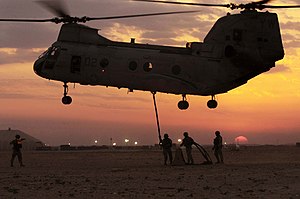 Image via WikipediaWe don't know what you're hearing about the still missing QDDR, but word has it that the "office for the coordinator for reconstruction and stabilization (S/CRS) will continue to exist but will not be designated as the lead State Department agency for crisis response." Would that make S/CRS, the red headed step-child of Foggy Bottom? Remains to be seen.
Image via WikipediaWe don't know what you're hearing about the still missing QDDR, but word has it that the "office for the coordinator for reconstruction and stabilization (S/CRS) will continue to exist but will not be designated as the lead State Department agency for crisis response." Would that make S/CRS, the red headed step-child of Foggy Bottom? Remains to be seen.
In any case, we have posted previously here about a recent Prism article by Marc Grossman in NDU's Prism (Diplomacy Before and After Conflict | September 2010). In that same article, Ambassador Grossman also writes about State's S/CRS and floated the idea of creating a "new personnel specialty: the "expeditionary diplomat." Below is an excerpt:
One way for State to further support the S/CRS effort would be to consider creating a new personnel specialty: the "expeditionary diplomat." Washington's diplomatic personnel have, of course, always been in one sense expeditionary; the majority of the Foreign Service is deployed abroad the majority of the time. But the post-9/11 diplomatic experience, and especially the effort in Iraq and Afghanistan, means that State needs to be more explicit about the expeditionary nature of some of its future diplomatic work and should prepare a small but significant number of people to serve successfully in the hardest places at a moment's notice.
Experience with the Provincial Reconstruction Teams in Iraq and Afghanistan, the lessons learned with S/CRS, and the example of diplomats who have pursued careers in the toughest posts should lead State leadership to conclude that this is a step worth taking. The first requirement would be advanced training, some of it provided by DOD and some by the Central Intelligence Agency, for those entering diplomats who believe they want to pursue this special career path. These entering officers would make an explicit choice and understand that an investment in their extra training would require their service in hard places, just as we now ask diplomats who take the hardest languages— Chinese or Arabic, for example—to serve more than one tour using their skills. Since these expeditionary diplomats will not need to meet the same age and physical requirements as special operations in the military, the State Department could allow people to opt in and out of this "special force" during their careers as long as they have the proper training. This would allow flexibility across the institution and encourage those who desire or whose family circumstances might change over time to participate as well. The department would also need to make sure those taking this career path are recognized for a career beyond the norm for Foreign Service and are promoted and rewarded.
Ambassador Grossman's entire article in the September issue of Prism is available here.
In Guidelines for Nation Builders (Strategic Studies Quarterly ♦ Fall 2010), Ambassador James F. Dobbins (lead author of the three-volume RAND History of Nation-Building and Occupying Iraq: A History of the Coalition Provisional Authority) has this about reconstruction:
The term reconstruction, when used to describe the reform of postconflict societies, conveys the sense that physical rebuilding of homes, factories, roads, and power plants destroyed in the war is the prime need. This is misleading. Even more than infrastructure, nations emerging from conflict need better institutions. In most cases, these institutions need to be refashioned, not just rebuilt, since it is the old institutions that will have failed in the first place. This is as true in the economic sphere as in the political. Novelty, however, is not necessarily a virtue. Institutions should be refashioned with an eye to local history and culture as well as to efficiency if the changes are to secure broad and enduring acceptance.
As regards physical infrastructure, the intervening authorities should give priority to fixing those related to security, health care, education, power, water, and sanitation in an effort to raise these services to something approaching prewar levels. The focus should be on emergency repair, not new investment.
Well, so what do you think of that? Training from DOD and the CIA (how about the Corps of Engineer?).
We get the idea of training on milcraft and spycraft, that would help make the civilians "hardy" in the dangerous world out there but who is going to train these new diplomats with the skills needed in reconstruction and nation building efforts? And emergency repairs?
We'll have a related post on the Provincial Reconstruction Teams and State leadership on this issue shortly.



1 comment:
I like it. USSOCOM has been sending Civil Affairs and SF teams to "build local governance and security capacity" for years in an effort to preempt bad governance, which leads to insurgency and instability. I always thought that the Civil Affairs units should be controlled by State. That way you have DOD SF units conducting Foreign Internal Defense (FID) and Civil Affairs teams conducting Foreign Internal Governance (FIG...just made that up) or something like it. Unfortunately the Army doesn't see building local governance capacity (outside of Iraq/Afghanistan) as their job and it isn't. It should be the State Dept. who send these "trainers" out to work under the US Ambassadors in country, instead of under the Combatant Command and USSOCOM. This would be an excellent way to give State an expeditionary capability while working with the DOD on preempting bad governance by increasing local governance and security capacity. However, the entire program should be coordinated through State and the US Ambassadors who would request this capability.
Thoughts?
Post a Comment